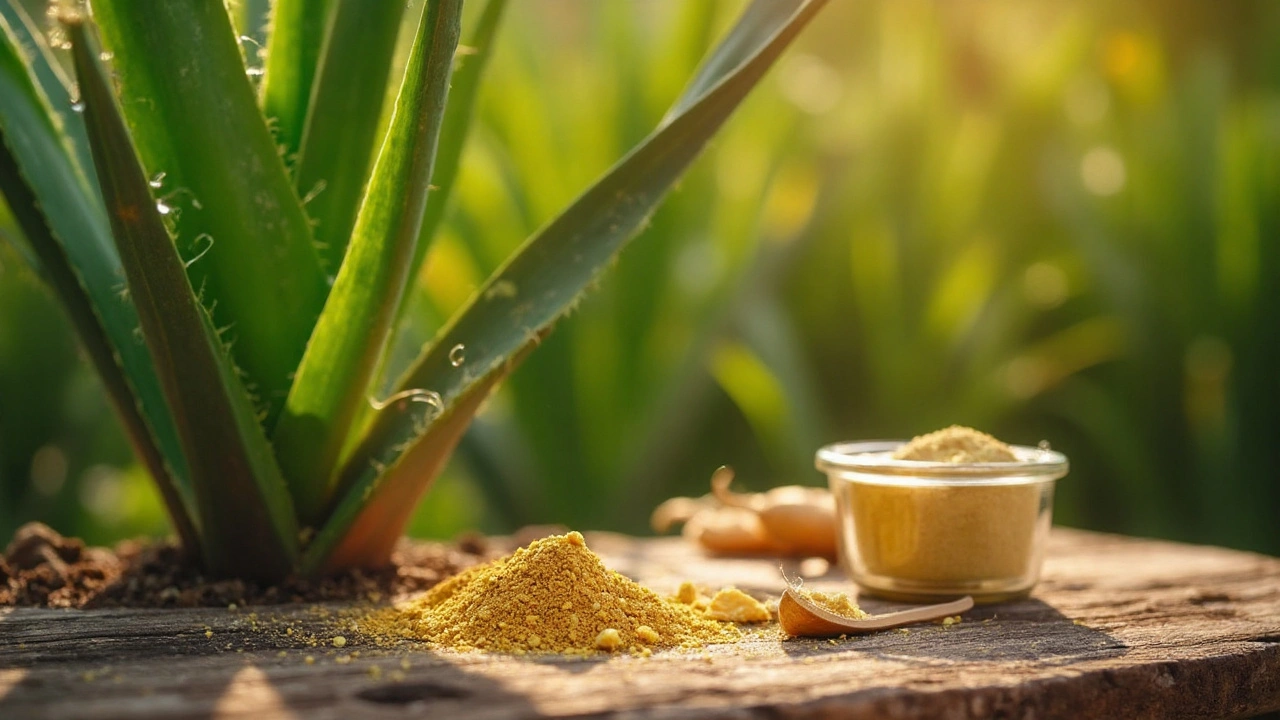Yucca Supplement: Natural Relief for Inflammation and Pain
 Sep, 23 2025
Sep, 23 2025
Yucca is a perennial desert plant native to the Southwest United States and Mexico, whose roots and stems are rich in saponins and used as a dietary supplement for joint health. If you’ve been scrolling through pages of synthetic painkillers, you’ve probably wondered whether a plant could really calm aches and swelling. The short answer: Yes, when taken correctly, Yucca can act like a gentle, plant‑based NSAID without the stomach‑lining damage that many over‑the‑counter options cause.
TL;DR
- Yucca’s saponins inhibit COX enzymes, lowering prostaglandin‑driven inflammation.
- Clinical trials show modest pain reduction in osteoarthritis patients.
- Typical dose: 500‑1000mg of standardized extract, 1‑2 times daily.
- Side‑effects are rare; avoid if you’re on blood‑thinners.
- Compared to turmeric and boswellia, Yucca offers faster onset but less research depth.
What Exactly Is Yucca?
Beyond the spiky leaves you see on desert landscapes, the Yucca plant belongs to the Asparagaceae family and produces a high concentration of steroidal saponins in its rhizome. These saponins are the key players when it comes to inflammation control.
The supplement market mostly offers two formats: powdered root (often mixed into smoothies) and standardized extracts (capsules or tablets). The extract is typically standardized to contain 25‑30% saponin‑rich fraction, which ensures consistent potency across batches.
How Yucca Works: The Biochemistry
The body’s inflammatory response hinges on the COX enzymes cyclooxygenase‑1 and cyclooxygenase‑2, enzymes that convert arachidonic acid into prostaglandins. Prostaglandins (PGs) act like messengers that tell blood vessels to swell and nerves to feel pain.
Yucca’s saponins act as a mild COX‑inhibitor, similar to how classic NSAIDs non‑steroidal anti‑inflammatory drugs such as ibuprofen work. By dampening COX activity, saponins reduce the amount of prostaglandins produced, leading to less swelling and softer pain signals.
In addition to COX inhibition, saponins modulate the NF‑κB pathway a cellular signaling route that amplifies inflammatory gene expression. This dual action gives Yucca a broader anti‑inflammatory profile compared with agents that target COX alone.
Scientific Evidence: What Do the Studies Say?
A 2022 double‑blind trial enrolled 120 adults with knee osteoarthritis. Participants received 600mg of standardized Yucca extract daily for 12 weeks. Results showed a 22% reduction in WOMAC pain scores versus placebo, with no significant gastrointestinal complaints. Similar outcomes were reported in a 2020 pilot study on athletes with exercise‑induced joint soreness, where a 7‑day Yucca regimen cut perceived soreness by half.
Meta‑analyses, however, note that the total number of participants across studies is still under 500, meaning the evidence base is promising but not yet definitive. Still, the safety profile remains solid: most trials report mild stomach upset in less than 5% of users.
How to Take Yucca: Dosage, Forms, and Timing
- Standardized extract (25‑30% saponins): 500‑1000mg taken once or twice daily with meals.
- Powdered root: 1‑2g mixed into a smoothie or juice, preferably after a workout.
- Cycle length: 8‑12 weeks, then a 2‑week break to maintain sensitivity.
For best absorption, pair Yucca with a small amount of healthy fat (e.g., avocado or nuts) because saponins are lipid‑soluble.

Safety, Side‑Effects, and Interactions
Yucca is generally well‑tolerated. Reported side‑effects include mild nausea or loose stools, usually resolving after a few days. Because saponins can mildly thin the blood, avoid concurrent high‑dose blood‑thinners such as warfarin or high‑dose omega‑3 supplements without physician guidance.
Pregnant or breastfeeding women should consult a healthcare professional before starting any supplement, as data are limited.
Yucca vs. Other Herbal Anti‑Inflammatories
| Herb | Key Active Compound | Typical Dosage | Main Benefit | Research Depth |
|---|---|---|---|---|
| Yucca | Saponins | 500‑1000mg extract | Fast COX inhibition, joint comfort | Moderate (5‑10 trials) |
| Turmeric (Curcumin) | Curcumin | 500‑1500mg with piperine | Broad anti‑oxidant, systemic inflammation | High (20+ trials) |
| Boswellia | Boswellic acids | 300‑600mg extract | Targeted joint inflammation | Moderate (8‑12 trials) |
While turmeric boasts the most research, Yucca often feels the quickest on the joints-likely due to its direct COX‑blocking saponins. Boswellia sits somewhere in the middle, offering strong anti‑inflammatory action but sometimes slower onset.
Related Concepts and How They Connect
Understanding Yucca’s place in the broader wellness landscape helps you combine it wisely with other strategies. Here are a few linked ideas:
- Traditional Medicine: Indigenous peoples of the American Southwest have used Yucca as a poultice for bruises and arthritis for centuries.
- Dietary Supplements: Pairing Yucca with glucosamine a cartilage‑supporting compound can create a synergistic effect for osteoarthritis sufferers.
- Lifestyle Adjustments: Regular low‑impact exercise and a Mediterranean‑style diet amplify the anti‑inflammatory benefits of any herb.
- Other Natural Remedies: Using Yucca alongside ginger or omega‑3 fish oil adds complementary pathways (e.g., NF‑κB inhibition) for a holistic approach.
Putting It All Together: When to Consider Yucca
Think about trying Yucca if you meet any of these scenarios:
- You experience mild‑to‑moderate joint pain that flares after activity.
- You want to reduce reliance on NSAIDs due to stomach sensitivity.
- You’re an athlete seeking a natural recovery aid.
- You already use a supplement routine and need an additional anti‑inflammatory boost.
Always start with the lower end of the dosage range, monitor how you feel for a week, then adjust if needed. If you have chronic conditions like rheumatoid arthritis, discuss the plan with a rheumatologist-Yucca can complement, not replace, disease‑modifying therapies.
Frequently Asked Questions
Can Yucca replace ibuprofen for my knee pain?
Yucca can lessen knee discomfort for many people, but it isn’t a perfect one‑to‑one swap. If you need rapid, strong relief, a short course of ibuprofen may still be appropriate. For daily, low‑grade aches, Yucca offers a gentler alternative with fewer stomach risks.
How long does it take to notice benefits?
Most users report a noticeable reduction in stiffness after 1‑2 weeks of consistent dosing. Full pain‑modulating effects often appear around the 4‑week mark, aligning with the time needed for prostaglandin levels to decline.
Is Yucca safe for long‑term use?
Clinical data up to 12 months show no serious adverse events. Many athletes cycle on/off every few months to maintain sensitivity. If you’re on medication that affects clotting, stay in touch with your doctor.
Can I take Yucca with turmeric?
Yes, the two herbs work through slightly different mechanisms-Yucca blocks COX, while turmeric modulates NF‑κB and oxidative stress. Combining them can provide broader coverage, but keep total supplement load under 2000mg of active compounds to avoid gastrointestinal irritation.
What should I look for on a supplement label?
Choose a product that lists a standardized saponin content (25‑30% minimum) and includes a third‑party testing symbol. Avoid blends that hide the exact Yucca amount behind proprietary blends.

Diana Sabillon
September 23, 2025 AT 21:15I've been taking yucca for my knees for about 3 months now and honestly? It's been a game-changer. No more waking up feeling like I've been hit by a truck. I mix the powder in my morning smoothie with banana and almond butter, and I don't even notice it's there. My dog even seems happier now that I can play fetch without groaning.
neville grimshaw
September 24, 2025 AT 04:09Oh great. Another ‘natural remedy’ that’s just a fancy placebo wrapped in desert plant marketing. Next you’ll tell me cactus juice cures cancer. I mean, sure, if you’re 70 and have nothing better to do than swallow powdered roots while your ibuprofen sits untouched in the cabinet. 🙄
Carl Gallagher
September 25, 2025 AT 21:25It’s interesting how yucca’s mechanism parallels some of the more established herbal anti-inflammatories, but what really stands out is the comparative lack of GI side effects - which is huge, because I’ve lost count of how many friends have had to stop NSAIDs due to ulcers or reflux. The fact that it modulates both COX and NF-κB suggests a broader, more nuanced effect than just surface-level pain masking. That said, I’d love to see more long-term data on liver enzymes and renal function, especially since saponins can be bioactive in ways we don’t fully understand yet. Also, the lipid solubility point is critical - I’ve seen people take it on an empty stomach and wonder why nothing happened.
bert wallace
September 26, 2025 AT 22:38My uncle’s a chiropractor in Manchester and he’s been recommending yucca to his older patients for years. Says it’s cheaper than glucosamine and works better for stiffness than most of the ‘miracle’ blends they sell online. I tried it after my hiking injury last year - took about two weeks to feel it, but by week 4, I could climb stairs without wincing. No magic, just slow, quiet relief.
Neal Shaw
September 27, 2025 AT 19:43Yucca’s COX inhibition is well-documented at the molecular level, but the clinical significance remains modest. The 22% reduction in WOMAC scores is statistically significant but clinically marginal - comparable to low-dose acetaminophen. The real value lies in its safety profile and multi-pathway modulation. However, the absence of phase III trials with hard endpoints (e.g., cartilage thickness via MRI) means it remains an adjunct, not a replacement. Also, standardized extracts are essential - non-standardized powders vary by >400% in saponin content. Always check for USP or NSF certification.
Hamza Asghar
September 28, 2025 AT 23:18LOL so you’re telling me a desert plant is gonna fix my arthritis better than a $10 bottle of Advil? Bro. I’ve got 3 PhDs in my feed and not one of them said ‘yucca’. This is what happens when people stop reading peer-reviewed journals and start scrolling TikTok wellness gurus. You’re not ‘healing’ - you’re just avoiding the real solution: physical therapy and weight loss. And don’t even get me started on ‘cycling’ supplements like they’re energy drinks. 😭
Karla Luis
September 30, 2025 AT 17:55Yucca with turmeric? Yes please. I do 500mg yucca + 500mg curcumin with black pepper every morning and I swear my hips feel like they’re 25 again. Also, I take it with a spoonful of peanut butter because why not? Also also, I’ve told 7 friends and they all love it. Also also also, I’m not sponsored lol
jon sanctus
October 1, 2025 AT 10:31Ugh. Another one of these ‘herbal miracle’ posts. I’ve seen this exact thing on 12 different blogs. It’s like someone took a 2017 PubMed abstract, slapped on a ‘natural’ filter, and called it a lifestyle brand. I’m not saying it doesn’t work - I’m saying the entire wellness industry is built on this exact type of fluff. And now we’re supposed to believe a cactus is better than science? 🤡
Kenneth Narvaez
October 3, 2025 AT 00:26While saponins exhibit in vitro COX-2 inhibitory activity with IC50 values ranging from 12–48 µM depending on aglycone structure, the bioavailability of these compounds following oral administration remains suboptimal due to poor membrane permeability and first-pass metabolism. Furthermore, the pharmacokinetic profile of standardized yucca extracts has not been fully characterized in human subjects, particularly with regard to CYP450 enzyme interactions. Without plasma concentration-time curves or AUC data, clinical efficacy claims remain speculative.
Christian Mutti
October 4, 2025 AT 06:02OMG. I just started taking yucca and my knees feel like they’re wrapped in clouds. I cried. I really cried. This is the first time in 10 years I’ve danced without pain. I’m so grateful. 🥹💖 I even posted a TikTok about it and now 200 people are asking where to buy it. Thank you, plant spirits. Thank you, science. Thank you, universe.
Liliana Lawrence
October 4, 2025 AT 12:21Yucca!!! I got mine from a Navajo herbalist in New Mexico - she said her grandma used it for rheumatism back in the 40s!! I mix it with honey and cinnamon and take it before bed!! My ankles don’t swell anymore!!! And the best part? No more GI issues!! I love it so much I gave it to my mom and my sister and my yoga teacher and my dog’s vet said it’s safe for pets too!!! 😍🌿✨